|
|
|
Sort Order |
|
|
|
Items / Page
|
|
|
|
|
|
|
| Srl | Item |
| 1 |
ID:
124415
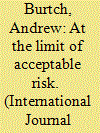

|
|
|
|
|
| Publication |
2013.
|
| Summary/Abstract |
Canada's first fighting season in Kandahar was traumatic. More than 40 soldiers were killed and several hundred injured. The unexpected strength of the insurgents' offensive was, in the Canadian experience, made worse by the extremely disappointing performance of the Afghan National Army and Afghan National Police. Improving the capabilities of the Afghan National Security Forces soon became an urgent concern and possible exit strategy. Part of Canada's answer was the Operational Mentor and Liaison Team (OMLT), which consisted of small groups of soldiers working side by side with Afghan forces to build their capability. This paper, based on interviews with former OMLT mentors, examines the origins and expansion of the Canadian OMLT, and offers an initial assessment of its impact.
|
|
|
|
|
|
|
|
|
|
|
|
|
|
|
|
| 2 |
ID:
124411
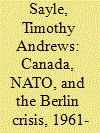

|
|
|
|
|
| Publication |
2013.
|
| Summary/Abstract |
Historians of Canadian foreign affairs have argued that Canada played an important role in influencing allied policy during the Berlin Crisis of 1961-1962. Newly declassified documents reveal the opposite. Canada opposed much of the North Atlantic Treaty Organization (NATO) contingency planning during the crisis, especially plans calling for the demonstrative use of nuclear weapons. Despite Canada's efforts to modify NATO's Berlin Contingency plans (BERCONs), Canadian diplomats found themselves isolated in the North Atlantic Council (NAC) and accepted plans they considered to be dangerous. Canada had no significant influence on NATO military planning during one of the most serious crises of the Cold War.
|
|
|
|
|
|
|
|
|
|
|
|
|
|
|
|
| 3 |
ID:
124414


|
|
|
|
|
| Publication |
2013.
|
| Summary/Abstract |
This article analyzes the Government of Canada's decision to lobby the North Atlantic Treaty Organization (NATO) to lead the International Security Assistance Force (ISAF) in Afghanistan in 2003. Although studies have been conducted on Canada's choice to deploy to Kandahar province, the decision to lobby NATO, and the diplomatic efforts that resulted, have been given little attention. In addition, Ottawa's decision to propose joint leadership of the mission with Germany in 2003 warrants further study. This article considers three key motivations evident in the Canadian government's thinking-first, its view of deployment to Afghanistan as an alternative to deployment to Iraq; second, its interest in developing relations with Germany; and finally, its more general motivation to return to the conflict.
|
|
|
|
|
|
|
|
|
|
|
|
|
|
|
|
| 4 |
ID:
124412
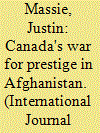

|
|
|
|
|
| Publication |
2013.
|
| Summary/Abstract |
This article provides a comprehensive assessment of Canada's prolonged and sizable military engagement in the war in Afghanistan in light of confounding expectations set by realism. It argues, from the perspective of neoclassical realism, that United States unipolarity, domestic elite consensus on an Atlanticist security policy, and executive autonomy vis-à-vis public dissent best account for Canada's evolving Afghanistan policy. These necessary conditions can be generalized to apply to past and future allied coalitions of the willing to help make sense of Canada's alliance burden-sharing.
|
|
|
|
|
|
|
|
|
|
|
|
|
|
|
|
| 5 |
ID:
124410
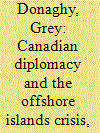

|
|
|
|
|
| Publication |
2013.
|
| Summary/Abstract |
In September 1954 forces from the People's Republic of China began shelling Chinese Nationalist positions on the tiny offshore islands that lay between the mainland and Formosa (present-day Taiwan). The outsized US response to this routine harassment sparked a Cold War confrontation that soon threatened to escalate out of control. This paper explores Canada's stake in that crisis. It follows Ottawa's early reaction to the events in the straits and traces foreign minister Lester B. Pearson's mediatory efforts to promote negotiations and a peaceful settlement. Pearson's liberal internationalist impulses, the paper argues, were always balanced and shaped by a realist calculation of where Canada's national interest lay. His doubts about the wisdom of US policy and his commitment to allied unity ensured that he beat a dignified retreat when the circumstances for peacemaking proved unpropitious.
|
|
|
|
|
|
|
|
|
|
|
|
|
|
|
|
| 6 |
ID:
124418
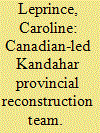

|
|
|
|
|
| Publication |
2013.
|
| Summary/Abstract |
The record of the Canadian-led Provincial Reconstruction Team (PRT) in Kandahar province, Afghanistan, provides a unique opportunity to evaluate the efficiency of Canada's recently adopted whole-of-government approach to conflict situations. This study maps the evolution of the interagency dynamics of Canadian departments and agencies during their six-year involvement with the PRT, and reveals that the Canadian-led PRT had to undergo significant changes before real interdepartmental collaboration actually could take place. While the first two years of the implementation of the whole-of-government approach have been described as a failure, this article argues that the publication of the Independent Panel on Canada's Future Role in Afghanistan was the turning point that significantly improved interagency collaboration in the PRT.
|
|
|
|
|
|
|
|
|
|
|
|
|
|
|
|
| 7 |
ID:
124416
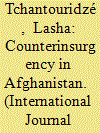

|
|
|
|
|
| Publication |
2013.
|
| Summary/Abstract |
After a decade of bloodshed and suffering, the western-sponsored coalition in Afghanistan led by the North Atlantic Treaty Organization (NATO) has failed to win the "hearts and minds" of locals. The tremendous sacrifices by the United States, Canada, and their allies have produced some tangible results, but steps forward have been made on the shaky ground of overall insecurity and violence and have primarily been associated with certain urban developments, while most of Afghanistan remains deeply rural in its feudal social order and conservative Islamic traditions. Although the Canadian experience in Afghanistan has been very different in its scope and objectives from the Soviet Union's operations of the 1980s, certain important parallels, particularly concerning counterinsurgency, can be discerned.
|
|
|
|
|
|
|
|
|
|
|
|
|
|
|
|
| 8 |
ID:
124419
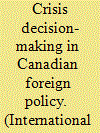

|
|
|
|
|
| Publication |
2013.
|
| Summary/Abstract |
In 1985 the Canadian government closed its embassy in Lebanon and opened a mission in Syria. This realignment occurred amid charges from Lebanon and the Lebanese diaspora in Canada that the government was abandoning Lebanon at the moment of its greatest need and rewarding the malevolent Ba'ath regime in Damascus. The Canadian Department of External Affairs, under the leadership of Secretary of State Joe Clark, risked political fallout from this controversy-such as outrage from Lebanese and Israeli diaspora communities in Canada, injured relations with Israel, Lebanon, and Syria, and partial responsibility for the deteriorating human security situation in Lebanon-in favour of protecting the Canadian embassy staff from escalating violence in Beirut and seizing the opportunity to open a long overdue diplomatic presence in Damascus, Syria, from which the hard-line Ba'ath party dominated much of the region's politics.
|
|
|
|
|
|
|
|
|
|
|
|
|
|
|
|
| 9 |
ID:
124421


|
|
|
|
|
| Publication |
2013.
|
| Summary/Abstract |
Canada's engagement in Afghanistan, following in the wake of the United States led 7 October 2001 military invasion, has proven to be the most significant and closely observed Canadian international policy initiative since the Korean War. Over the past 12 years Ottawa has made a significant series of commitments to Afghanistan military, political, diplomatic, economic and social that have placed the Canadian - Afghan relationship at the centre of Canadian external relations.
|
|
|
|
|
|
|
|
|
|
|
|
|
|
|
|
| 10 |
ID:
124413
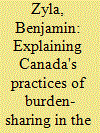

|
|
|
|
|
| Publication |
2013.
|
| Summary/Abstract |
While Canadian burden-sharing practices within NATO in the 1990s are well documented, the data in the literature raise two central questions: (1) was the practice of Canadian burden-sharing a one-time event, or was it part of a larger pattern of practices? and (2) what factors motivated Canada to shoulder the burden to the extent that it did? This article studies the extent of Canada's burden-sharing practices in the context of the International Security Assistance Force (ISAF) mission in Afghanistan. The article makes two arguments: first, Canada's commitment to NATO continued to be strong post-9/11; second, Canada's practices of sharing Atlantic burdens can be explained by its adherence to the norm of "external responsibility," which guided its foreign policy by appealing to Canada's humanitarian responsibilities to contribute at an extraordinary level to the promotion and maintenance of international peace and security.
|
|
|
|
|
|
|
|
|
|
|
|
|
|
|
|
| 11 |
ID:
124417
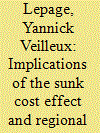

|
|
|
|
|
| Publication |
2013.
|
| Summary/Abstract |
Much of the literature on casualty sensitivity suggests that there is an inverse correlation between casualty levels and public support for war. It also suggests that a public will be more sensitive to local casualties. This article tests these pre-existing theses using data from Canada's participation in the war in southern Afghanistan between February 2006 and 2011. Studying the impact of both provincial and nationwide casualties, it finds no evidence to support these assumptions. Instead, this study finds strong indications that nationwide casualties led to a short-term increase in public support for the Afghan mission. This result is attributed to the sunk cost effect.
|
|
|
|
|
|
|
|
|
|
|
|
|
|
|
|
| 12 |
ID:
124420
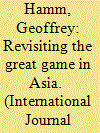

|
|
|
|
|
| Publication |
2013.
|
| Summary/Abstract |
The history of the Great Game in Asia, the contest between the British Empire and the Russian Empire for control of Central Asia, is dominated by popular writers attempting to uncover the "true" story of Rudyard Kipling's Kim, the story of the an orphaned Anglo-Irish son of a British soldier growing up in the streets and bazaars of British India. These books, often lacking any sense of historical context or a broader political narrative, tend to forego judicious historical analysis in favour of salacious adventure stories.
|
|
|
|
|
|
|
|
|
|
|
|
|
|
|
|
|
|
|
|
|